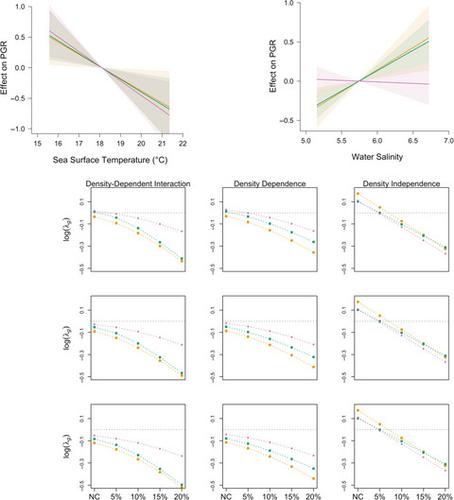当前位置:
X-MOL 学术
›
J. Anim. Ecol.
›
论文详情
Our official English website, www.x-mol.net, welcomes your
feedback! (Note: you will need to create a separate account there.)
Detrimental impacts of climate change may be exacerbated by density dependent population regulation in blue mussels
Journal of Animal Ecology ( IF 3.5 ) Pub Date : 2020-11-05 , DOI: 10.1111/1365-2656.13377 Kim Jaatinen 1 , Mats Westerbom 2 , Alf Norkko 2 , Olli Mustonen 2 , David N. Koons 3
Journal of Animal Ecology ( IF 3.5 ) Pub Date : 2020-11-05 , DOI: 10.1111/1365-2656.13377 Kim Jaatinen 1 , Mats Westerbom 2 , Alf Norkko 2 , Olli Mustonen 2 , David N. Koons 3
Affiliation

|
The climate on our planet is changing and the range distributions of organisms are shifting in response. In aquatic environments, species might not be able to redistribute poleward or into deeper water when temperatures rise because of barriers, reduced light availability, altered water chemistry, or any combination of these. How species respond to climate change may depend on physiological adaptability, but also on the population dynamics of the species. Density dependence is a ubiquitous force that governs population dynamics and regulates population growth, yet its connections to the impacts of climate change remain little known, especially in marine studies. Reductions in density below an environmental carrying capacity may cause compensatory increases in demographic parameters and population growth rate, hence masking the impacts of climate change on populations. On the other hand, climate-driven deterioration of conditions may reduce environmental carrying capacities, making compensation less likely and populations more susceptible to the effects of stochastic processes. Here we investigate the effects of climate change on Baltic blue mussels using a 17-year data set on population density. Using a Bayesian modelling framework, we investigate the impacts of climate change, assess the magnitude and effects of density dependence, and project the likelihood of population decline by the year 2030. 4. Our findings show negative impacts of warmer and less saline waters, both outcomes of climate change. We also show that density-dependence increases the likelihood of population decline by subjecting the population to the detrimental effects of stochastic processes (i.e., low densities where random bad years can cause local extinction, negating the possibility for random good years to offset bad years). We highlight the importance of understanding, and accounting for both density dependence and climate variation when predicting the impact of climate change on keystone species, such as the Baltic blue mussel.
中文翻译:

蓝贻贝的密度依赖性种群调节可能会加剧气候变化的不利影响
我们星球上的气候正在发生变化,生物的范围分布也在相应变化。在水生环境中,由于障碍、光照减少、水化学改变或这些因素的任何组合,当温度升高时,物种可能无法重新分布到极地或更深的水中。物种对气候变化的反应可能取决于生理适应性,但也取决于物种的种群动态。密度依赖是一种无处不在的力量,它控制着人口动态和调节人口增长,但它与气候变化影响的联系仍然鲜为人知,尤其是在海洋研究中。低于环境承载能力的密度降低可能导致人口参数和人口增长率的补偿性增加,从而掩盖了气候变化对人口的影响。另一方面,气候驱动的条件恶化可能会降低环境承载能力,使补偿的可能性降低,人口更容易受到随机过程的影响。在这里,我们使用 17 年的人口密度数据集调查气候变化对波罗的海贻贝的影响。使用贝叶斯建模框架,我们调查了气候变化的影响,评估了密度依赖的程度和影响,并预测了到 2030 年人口下降的可能性。 4. 我们的研究结果显示了更温暖和更少咸水的负面影响,两者都是气候变化的结果。我们还表明,通过使人口受到随机过程的不利影响(即,低密度,随机坏年会导致局部灭绝,否定随机好年抵消坏年的可能性),密度依赖性增加了人口下降的可能性。 . 在预测气候变化对波罗的海蓝贻贝等关键物种的影响时,我们强调了理解和考虑密度依赖性和气候变化的重要性。
更新日期:2020-11-05
中文翻译:

蓝贻贝的密度依赖性种群调节可能会加剧气候变化的不利影响
我们星球上的气候正在发生变化,生物的范围分布也在相应变化。在水生环境中,由于障碍、光照减少、水化学改变或这些因素的任何组合,当温度升高时,物种可能无法重新分布到极地或更深的水中。物种对气候变化的反应可能取决于生理适应性,但也取决于物种的种群动态。密度依赖是一种无处不在的力量,它控制着人口动态和调节人口增长,但它与气候变化影响的联系仍然鲜为人知,尤其是在海洋研究中。低于环境承载能力的密度降低可能导致人口参数和人口增长率的补偿性增加,从而掩盖了气候变化对人口的影响。另一方面,气候驱动的条件恶化可能会降低环境承载能力,使补偿的可能性降低,人口更容易受到随机过程的影响。在这里,我们使用 17 年的人口密度数据集调查气候变化对波罗的海贻贝的影响。使用贝叶斯建模框架,我们调查了气候变化的影响,评估了密度依赖的程度和影响,并预测了到 2030 年人口下降的可能性。 4. 我们的研究结果显示了更温暖和更少咸水的负面影响,两者都是气候变化的结果。我们还表明,通过使人口受到随机过程的不利影响(即,低密度,随机坏年会导致局部灭绝,否定随机好年抵消坏年的可能性),密度依赖性增加了人口下降的可能性。 . 在预测气候变化对波罗的海蓝贻贝等关键物种的影响时,我们强调了理解和考虑密度依赖性和气候变化的重要性。











































 京公网安备 11010802027423号
京公网安备 11010802027423号